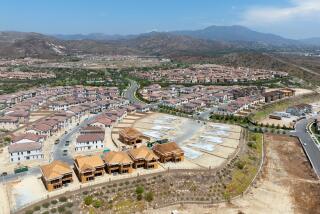Infrastructure Graded and Warnings Sounded
- Share via
Schools in disrepair. Backed-up sewers. Polluted beaches.
Is Orange County threatened with an infrastructure meltdown?
A UC Irvine-led coalition of academics, development consultants, public officials and others are warning that the county may be if the problems are left unresolved. The group spent six months studying the county’s infrastructure, leading to Thursday’s release of a “report card” on it.
Although the county’s overall infrastructure rates a C, the grade is dangerously close to an F for schools and urban runoff. Grades are also in significant danger of sliding even in those areas where the county is doing well.
The project is an offshoot of an annual national report card that the American Society of Civil Engineers began putting out last year. In the society’s March report, the nation’s average infrastructure grade was a D-plus. Orange County fares better, those involved in the project say, because most of the roads, sewers, water systems and other public facilities are newer.
Robert Bein, who was president of the society when the national report card came out and is the CEO of RBF Consulting in Irvine, organized the Orange County project with UCI Civil and Environmental Engineering Affiliates.
“We did this to raise awareness that we are living on borrowed time with our infrastructure,” he said. “Now is the time to put in the resources needed that will get our infrastructure back up to a level that can support the quality of life we are used to in Orange County.”
The report graded eight areas: transportation, schools, water, aviation, parks, urban runoff, waste water and solid waste. The grades were given by committees of experts from each field who collected and evaluated data. Review councils of industry leaders, environmentalists and academics then critiqued the findings.
The schools group found widespread evidence of leaking roofs, broken pipes, seismic safety problems and even sinking buildings. They gave a grade of D-plus.
The county fared even worse on urban runoff, which received the lowest grade of all, a D. The report explained the grade by citing the 1999 shoreline closures in Huntington Beach. It says massive improvements to the county’s flood control system are needed. But it would take $1.2 billion worth of such improvements to bring the urban runoff grade to an A.
There was better news in the areas of water and solid waste, which each received a B. But the report warned that the grade could easily slip if those systems aren’t shored up and improved.
The report says most of these issues can be solved only at the local level.
“This places responsibility for infrastructure renewal and development squarely with individual voters,” the report says.
*
(BEGIN TEXT OF INFOBOX)
*
Room for Improvement
*
UC Irvine led a coalition, which included engineers and public officials, to assess Orange County’s infrastructure and “raise awareness that we are living on borrowed time.” The coalition report card:
*
WATER -- B
The county has 7,500 miles of water main pipes and 300 drinking water storage tanks that are aging.
*
AVIATION -- C+
Commercial air and air cargo demands need long-term solutions. The forecast for annual passengers in the county by 2025: 37 million, compared with the 8.4 million-passenger cap now at John Wayne Airport.
*
SCHOOL FACILITIES -- D+
A majority of the county’s public school buildings are old, outdated or overcrowded.
*
PARKS, RECREATION, ENVIRONMENT -- C
More state aid is recommended to maintain services.
*
TRANSPORTATION -- C
Another funding source like Measure M is needed to continue maintaining and improving the county’s transportation system.
*
URBAN RUNOFF -- D
More revenue is needed to improve aging facilities, and for new stormwater projects.
*
SOLID WASTE -- B
Proper planning is needed to decide the future location and use of landfills, as well as processing plants and waste transfer stations.
*
WASTEWATER -- C+
The county has 7,000 miles of sewer pipes and 240 pump stations that need to be maintained and upgraded to meet new federal regulations.
*
Source: UC Irvine
More to Read
Sign up for Essential California
The most important California stories and recommendations in your inbox every morning.
You may occasionally receive promotional content from the Los Angeles Times.














